
The Commodore 64, also known as the C64, is an 8-bit home computer introduced in January 1982 by Commodore International. It has been listed in the Guinness World Records as the highest-selling single computer model of all time, with independent estimates placing the number sold between 12.5 and 17 million units. Volume production started in early 1982, marketing in August for US$595. Preceded by the VIC-20 and Commodore PET, the C64 took its name from its 64 kilobytes(65,536 bytes) of RAM. With support for multicolor sprites and a custom chip for waveform generation, the C64 could create superior visuals and audio compared to systems without such custom hardware.

Commodore International was an American home computer and electronics manufacturer founded by Jack Tramiel. Commodore International (CI), along with its subsidiary Commodore Business Machines (CBM), was a significant participant in the development of the home computer industry in the 1970s to early 1990s. In 1982, the company developed and marketed the world's best-selling computer, the Commodore 64, and released its Amiga computer line in July 1985. Commodore was one of the world's largest personal computer manufacturers, with sales peaking in the last quarter of 1983 at $49 million.
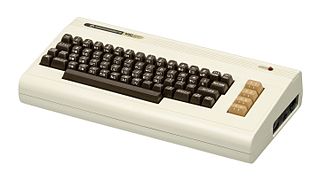
The VIC-20 is an 8-bit home computer that was sold by Commodore Business Machines. The VIC-20 was announced in 1980, roughly three years after Commodore's first personal computer, the PET. The VIC-20 was the first computer of any description to sell one million units. It was described as "one of the first anti-spectatorial, non-esoteric computers by design...no longer relegated to hobbyist/enthusiasts or those with money, the computer Commodore developed was the computer of the future."
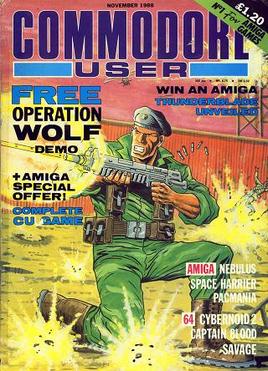
Commodore User, later renamed to CU Amiga is a series of American and British magazines published by Commodore International.

Compute!, often stylized as COMPUTE!, was an American home computer magazine that was published from 1979 to 1994. Its origins can be traced to 1978 in Len Lindsay's PET Gazette, one of the first magazines for the Commodore PET computer. In its 1980s heyday, Compute! Covered all major platforms, and several single-platform spinoffs of the magazine were launched. The most successful of these was Compute!'s Gazette, which catered to VIC-20 and Commodore 64 computer users.

The Three Stooges is a video game released by Cinemaware in 1987 for the Amiga based on the comedy trio of the same name. Players control Stooges Moe, Larry, and Curly in minigames based on Stooges films with the aim of raising enough money to save an orphanage. It was ported to the Apple IIGS, Commodore 64, MS-DOS, NES and Game Boy Advance. The game has been praised as a faithful adaptation of the Stooges films, but has been criticized for repetitive gameplay and limited replay value.

Compute!'s Gazette, stylized as COMPUTE!'s Gazette, was a computer magazine of the 1980s, directed at users of Commodore's 8-bit home computers. Announced as The Commodore Gazette, it was a Commodore-only daughter magazine of the computer hobbyist magazine Compute!. It was first published in July 1983.

The Commodore 64 Games System is the cartridge-based home video game console version of the popular Commodore 64 home computer. It was released in December 1990 by Commodore into a booming console market dominated by Nintendo and Sega. It was only released in Europe and was a considerable commercial failure. The C64GS came bundled with a cartridge containing four games: Fiendish Freddy's Big Top O'Fun, International Soccer, Flimbo's Quest, and Klax.
The Toronto PET Users Group is one of the world's oldest extant computer user groups, and was among the very largest. The non-profit group is based in Toronto but has an international membership. It supports nearly all Commodore computers, including the PET, VIC-20, C64, C128, Plus/4, C16, C65, and Amiga, including the COMAL, CP/M and GEOS environments. TPUG is noted for its ties with Commodore Canada, its extensive and widely distributed software library, and its association with prominent computing pioneers such as Jim Butterfield, Brad Templeton, Karl Hildon, and Steve Punter.
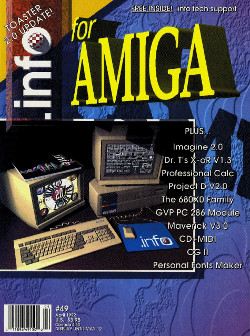
.info was a computer magazine covering Commodore 8-bit computers and later the Amiga. It was published from 1983 to 1992.
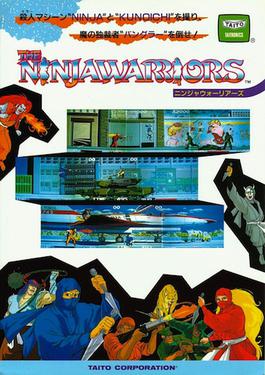
The Ninja Warriors (ニンジャウォーリアーズ) is a side-scrolling beat 'em up video game developed and released by Taito in 1987. The original arcade game situated one display in between projected images of two other displays, creating the appearance of a triple-wide screen. Ports were released for home systems including the Amiga, Atari ST, ZX Spectrum, Commodore 64, Amstrad CPC, PC Engine, and Sega Mega-CD.

Amiga User International was a monthly computer magazine published in its later years by AUI Limited, it was the first dedicated Amiga magazine in Europe and in comparison to other Amiga magazines, AUI had a more serious perspective. One of the main features of AUI was the "AUI SuperDisks", which implemented multiple file systems and advanced compression techniques to hold far more data than a standard magazine cover disk.

Practical Computing was a UK computer magazine published monthly. The magazine was published by IPC Electrical Electronic Press Ltd. The headquarters was in Sutton, Surrey. The first edition was released in August 1978 as a special computer show edition, and the second issue was October 1978. The magazine carried on to 1987 when it merged with Business Computing. In September 1989, it was renamed Management Computing.

Pirate Adventure is a text adventure program written by Scott Adams.

Fun School is a series of educational packages developed and published in the United Kingdom by Europress Software, initially as Database Educational Software. The original Fun School titles were sold mostly by mail order via off-the-page adverts in the magazines owned by Database Publications. A decision was made to create a new set of programs, call the range Fun School 2, and package them more professionally so they could be sold in computer stores around the UK. Every game comes as a set of three versions, each version set to cater for a specific age range.
Argus Press was a British publishing company. It was acquired by British Electric Traction (BET) in 1966, and became the publishing arm of that company. It was the subject of one of the most hotly contested management buyouts of the 1980s when a management team led by Kimble Earl, George Fowkes, and Scott Smith secured financing of £207m from forty national and international banks to acquire the UK and US businesses from BET. The acquisition was of particular note as the publisher Robert Maxwell was among the rival bidders, and widely considered as capable of out-witting the management team. Only an eleventh-hour intervention by Earl – exposing members of Maxwell's secret consortium as rival newspaper publishers which meant Maxwell would fall foul of the Monopolies Commission – brought success for the management team. The new company traded under the name of Team Argus. Its portfolio of businesses included the largest group of paid-for and free weekly newspapers in the UK, an extensive range of business titles in the UK and the USA, and a group of specialist hobby-interest magazines in the UK. Team Argus businesses were sold off to various buyers during the early 1990s.
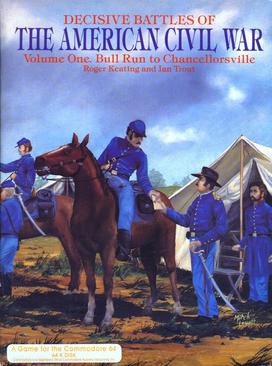
Decisive Battles of the American Civil War Volume 1: Bull Run to Chancellorsville is a computer wargame developed by Roger Keating and Ian Trout and published by Strategic Studies Group in 1988 for the Commodore 64 and Apple II. Two sequels were released in 1988: Volume 2: Gaines Mill to Chattanooga and Volume 3: Wilderness to Nashville.

Batman is an action video game developed and published by Ocean Software based on the 1989 film of the same name. It was released on 11 September 1989 for the Commodore 64 and ZX Spectrum with Amiga, Amstrad CPC, Atari ST, MS-DOS and MSX versions following soon after.
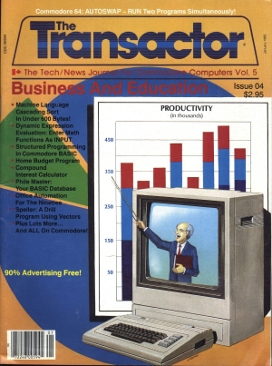
The Transactor was a computer magazine directed at users of Commodore home computers.

World of Commodore is an annual computer expo dedicated to Commodore computers.


















